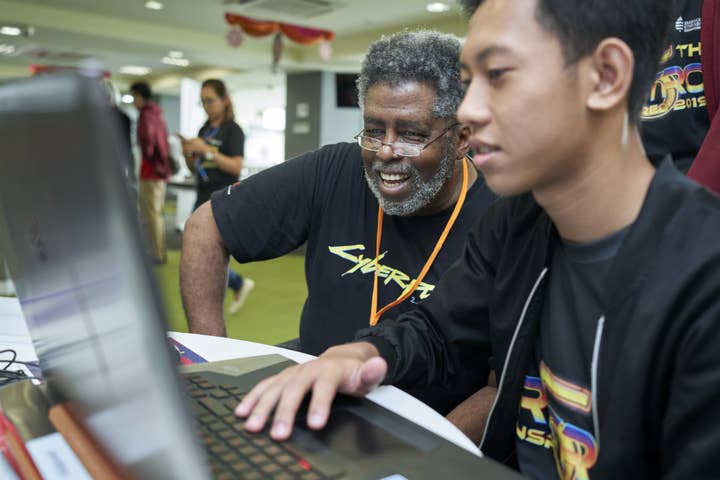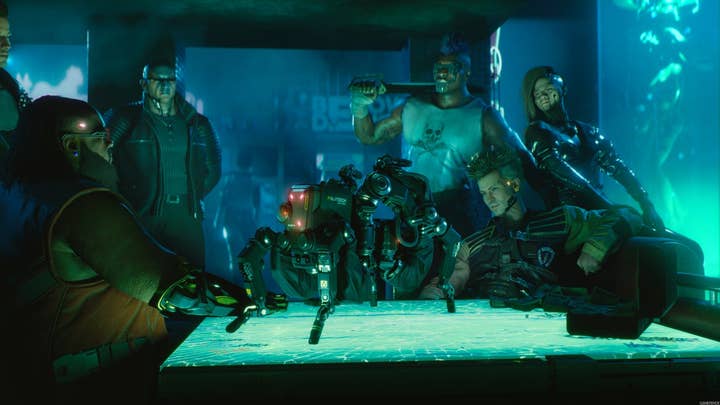Mike Pondsmith: "If you want to get somebody to see your point of view, don't preach"
The veteran designer on adapting to new technology, bringing Cyberpunk 2077 to 2020, and using games to tackle political and social themes
At the fifth annual Retro Inspired Game Jam at James Cook University in Singapore, students and local game developers dug into the past to create their own mini-game prototypes. Associate professor Roberto Dillon has been organizing this 24-hour game jam for the past five years, with the goal of giving students the chance to receive real industry feedback and experience. Dillon, who has authored several books on retro games and the Commodore 64, believes that the time is ripe for older game professionals to share their experience and knowledge with young developers.
To this end, Dillon invited Mike Pondsmith, arguably one of the industry's most influential game designers, to judge the competition. Pondsmith is an expert when it comes to the trend of remaking games and reshaping IP, having worked on adaptations of Dragonball Z, The Matrix and, of course, Cyberpunk.
Cyberpunk 2077 is one of the most anticipated game releases of next year -- an exciting addition to a cult series of games, and a bookend to the PlayStation 4 era. Pondsmith is working closely with Polish developer CD Projekt Red on 2077, which promises a rich reinterpretation of the tabletop world that he created decades ago through his acclaimed publishing company R. Talsorian Games.
"I'm just astounded that people really want to see this game and they're rooting for it"
"I'm just kind of astounded at how much positive reactions people have, that people really want to see this game and they're rooting for it," he tells GamesIndustry.biz.
But making games -- especially sci-fi games rooted in some kind of technological reality -- is quite different today. The first Cyberpunk tabletop game was released in 1988, and its sibling, Cyberpunk 2020, in 1990. Today's cultural landscape offers emerging technologies that weren't viable when the Cyberpunk world was born, and what really impresses Pondsmith today is the ubiquitous nature of technology.
"Technology is cheap," he says. "Even if food is no longer cheap, or housing isn't cheap, technology is really, really available. You're not going to have a world where cell phones don't exist. You can have good cell phones, you can have really crappy cell phones, but I personally own five cell phones and two of them, at least, I don't even use anymore. You're always going to have cell phones of some form."
Despite its high-octane depictions of hacking, body modifications, and other cutting-edge technology, Cyberpunk is a cautionary tale about a dark, paranoid future dominated by corporations and gangs. With the slick marketing and hyperbole surrounding 2077's release, Pondsmith thinks most people will initially be hooked by the shiny weaponry and cybernetic tech before engaging with the game's deeper socio-economic and political themes.

"Sooner or later, there's that moment where you stop and look at your hands as V [the game's protagonist], and you go 'my hands have been cut off at the elbows, and they're now machines.' I think a lot of times when you want your message out there about something that's bigger than a game, you have to let them find it themselves. We just lay it out like a trap and they step on it."
Today, the work of weaving political themes into AAA games can be a delicate balancing act, given the resources and money required to make them. As a pen-and-paper veteran, Pondsmith has witnessed the evolution of gaming into a powerful entertainment industry, where a major video game today will receive far more public scrutiny than the average tabletop game from the 1980s.
"When you want your message out there about something that's bigger than a game, you have to let players find it themselves"
"AAA titles are a lot of the ways they are because they're expensive as heck," Pondsmith says, reflecting on the punk nature of the pen-and-paper genre. "You know, when I started, it was three guys banging away in a garage somewhere, and that's not happening now. But the thing is, pen and paper isn't what it was, either. We led the desktop publishing revolution in gaming as Talsorian, but the stuff we produce now is far and away just astoundingly beautiful, visually."
Beyond visuals, the level of multimedia integration today means that Pondsmith can check out new tabletop figure designs on his phone and use 3D printing to make his own, where before it took a couple of years to see a figure come to fruition -- "I can get the files and run them off the printer in the office... That's astounding."
Cyberpunk Red is the tabletop prequel to 2077, and a fine example of Pondsmith's savvy grasp of multimedia and the business of game-making. He sees this new edition as a sort of bridge -- "I'd like to call it the Empire Strikes Back of the Cyberpunk world" -- between the past and 2077. The reference is particularly apt within the context of remaking games, as Pondsmith believes that, when it comes to storytelling, there are certain archetypes that people can relate to more than others.
"I'm working right now messing around with some Polynesian stories. And this is a culture that was separated from the rest of the planet for over a thousand years, and yet the same stories are there. So many of the same stories are stories that exist because they are part of the human condition."

Regardless of a story's origin, there is a plethora of media today through which to tell a story in many different ways. A game might end up getting turned into a film, a television show, or a comic. For Pondsmith, this means thinking hard about how a story might appear in different media -- "because if you don't, then what you're going to have is a game that can't travel very well." Many game development students at the start of their careers might eventually find themselves working on an adaptation of someone else's work.
On the other hand, game creators might find themselves on the other side of the table, dealing with people adapting their work into fan-fiction. Pondsmith, for all his cracks about being an industry veteran, is extremely in-tune with contemporary memes and pop culture -- he even admits to being especially fascinated by the My Little Pony fandom. He still pays attention to media trends and dissects the evolution of Cyberpunk within the context of the cyberpunk genre, which became especially popular after Wiliam Gibson's 1984 novel Neuromancer.
"We had transgender people in Cyberpunk in 1989...because my friends are transgender. So what's the deal?"
"We were lucky, because we came in on a literary wave... but it's interesting watching the transition now between 2077, which is a very visual structure," Pondsmith says of the way the Cyberpunk IP has adapted through different decades, audiences, and types of media. "If you ask somebody, 'what does Johnny Silverhand look like?' He looks like Keanu Reeves, of course. Well, he didn't. He was kind of blond. But you know, I could adapt."
With the rise of fan-made games, as well as better, more accessible creative software, there's also a powerful new element to consider in the entertainment business: fandom. Pondsmith pointed to Hasbro's history of observing fans' knockoff products and using it to their advantage as a form of free market research.
"You may find your game blown out of the water by someone's unauthorized game that they did better -- there are several interesting cases of that," he says, describing the art and fan-fiction produced by the prolific My Little Pony community. "Strong fandoms are cool because they generate a lot of content. I must confess, for example, many, many years ago when I was in college, my old girlfriend actually did the first Kirk/Spock slashfic magazine."
Cyberpunk fans have scrutinized the treatment of gender and race in 2077, which raises the question of how to reconcile older IPs with today's more progressive politics.
"The first thing is, if you want to get somebody to kind of see your point of view, don't preach," Pondsmith says, going on to address the issue of gender portrayal in 2077. "At least for Talsorian, we always had kind of a generally progressive leaning anyway. A lot of this is kind of like, 'yeah, we were doing this back in the '80s.' We had transgender people running around in Cyberpunk in 1989...because my friends are transgender. So what's the deal? Why not? But that's not preaching -- this is the world I see."
At the end of the day, remakes and reboots are always going to be a part of modern entertainment culture, and even with one eye fixed on the future, Pondsmith remains dedicated to preserving the old ways. During his teaching days, he purchased old game consoles to let his students experience what they were like -- a practice that he's built into his work at R. Talsorian Games.
"We have an entire area that is pretty much dedicated to these retro emulators of sorts," he says, "because there's just a tremendous amount of knowledge bound up in these games."
